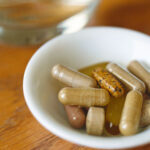 Lactobacillus bifidus is first introduced into the sterile intestines of the infant as a result of breast-feeding. Large numbers can soon be observed in the feces of the baby. L. bulgarious is commonly used as a yogurt culture, but it is incapable of proliferating in the human gut. Other friendly bacteria may thrive unless they are attacked by broad-spectrum antibiotic drugs. Additional beneficial lactobacillus strains include L. acidophilus, L. fermentum, L. casea, L. salivores, L. brevis and L. plantarum.
Lactobacillus bifidus is first introduced into the sterile intestines of the infant as a result of breast-feeding. Large numbers can soon be observed in the feces of the baby. L. bulgarious is commonly used as a yogurt culture, but it is incapable of proliferating in the human gut. Other friendly bacteria may thrive unless they are attacked by broad-spectrum antibiotic drugs. Additional beneficial lactobacillus strains include L. acidophilus, L. fermentum, L. casea, L. salivores, L. brevis and L. plantarum.
Lactobacilli are known to produce natural antibiotics of their own. For instance, L. acidophilus manufactures the antibiotic like enzymate agents’ acidolin, acidophilin, and lactocidin, L. brevis makes lactobacillin and lactobrevin, and L. Bulgarious produces bulgarican. Of these, the antimicrobial enzymes acidophilin and bulgarican are most effective against food born pathogens.
Acidophilus is used for a variety of health complaints. Anytime there is an imbalance in the gut leading to overgrowth of one bacterial species of another, supplementation with a good, viable acidophilus should be considered.
How do you use it?
Infant thrush – treat the mother (especially if she is breast-feeding) with oral supplements of L. bifidus. “Paint” the nipples before each infant feeding with a concentrated culture of L. bifidus.
Vaginitis – use implants of fresh (sugar free) yogurt in the vagina or water plus yogurt douches. There are also cultured vaginal implants available.
Intestinal infections – eat one or more cups of yogurt three or four times daily or take L. acidophilus concentrates that are naturally high in acidophilin, the naturally occurring antibiotic/anti-carcinogenic substance.
For milk intolerant patient or those with outright milk allergies, an acceptable way to avoid adverse reactions is to introduce potent amounts of the L. acidophilus organisms in small increments, beginning with one-quarter teaspoonful of powder or liquid – or one acidophilus capsule – two or three times daily.
In addition to their usefulness in antiyeast therapy, Lacto-bacilli strains have advantageous nutritional effects on vitamin and nutrient synthesis, anticholesteremic (cholesterol lowering effect) and antilipidemic (lowering blood fats) benefits and anti-viral activity. Lactobacillus supplementation or yogurt intake should always follow the use of broad-spectrum antibiotics to replace the friendly bacteria killed by the non-specific action of the drugs.
Check out our store for some of the best product on the market.